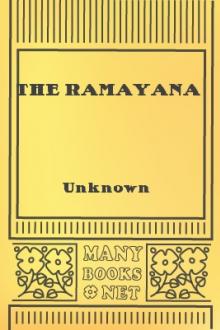The Ramayana - Valmiki (best ereader for epub txt) 📗

- Author: Valmiki
- Performer: -
Book online «The Ramayana - Valmiki (best ereader for epub txt) 📗». Author Valmiki
drew his bowstring: with the clang
From ease to west the welkin rang:
Then in his modest mood withdrew
A little from the ladies' view.
And sternly silent stood apart,
While wrath for Ráma filled his heart.
Sugríva knew the sounding string,
And at the call the Vánar king
Sprang swiftly from his golden seat,
And feared the coming prince to meet.
Then with cold lips that terror dried
To beauteous Tárá thus he cried:
“What cause of anger, O my spouse
Fair with the charm of lovely brows,
Sets Lakshmaṇ's gentle breast on fire,
And brings him in unwonted ire?
Say, canst thou see, O faultless dame,
A cause to fill his soul with flame?
For there must be a reason when
Such fury stirs the king of men.
Reveal the sin, if sin of mine
Anger the lord of Raghu's line.
Or go thyself, his rage subdue,
And with soft words his favour woo.
Soon as on thee his eyes are set
His heart this anger will forget,
For men like him of lofty mind
Are never stern with womankind.
First let thy gentle speech disarm
His fury, and his spirit charm,
And I, from fear of peril free,
The conqueror of his foes will see.”
She heard: with faltering steps and slow,
With eyes that shone with trembling glow,
With gold-girt body gently bent
To meet the stranger prince she went.
When Lakshmaṇ saw the Vánar queen
With tranquil eyes and modest mien,
Before the dame he bent his head,
And anger, at her presence, fled.
Made bold by draughts of wine, and cheered
By Lakshmaṇ's look no more she feared,
And in the trust his favour lent
She thus addressed him eloquent:
“Whence springs thy burning fury? say:
Who dares thy will to disobey?
Who checks the maddened flames that seize
On forests full of withered trees?”
Then Lakshmaṇ spoke, her mind to ease,
His kind reply in words like these:
“Thy lord his days in pleasure spends,
Heedless of duty and of friends,
Nor dost thou mark, though fondly true,
The evil path his steps pursue.
He cares not for affairs of state,
Nor us forlorn and desolate,
But sits a mere spectator still,
A sensual slave to pleasure's will.
Four months were fixed, the time agreed
When he should help us in our need:
But, bound in toils of pleasure fast,
He sees not that the months are past.
Where beats the heart which draughts of wine
To virtue or to gain incline?
Hast thou not heard those draughts destroy
Virtue and gain and love and joy?
For those who, helped at need, refuse
Their aid in turn, their virtue lose:
And they who scorn a friend disdain
A treasure naught may buy again.
Thy lord has cast his friend away,
Nor feared from virtue's path to stray,
If this be true, declare, O dame
Who knowest duty's every claim,
What further work remains for us
Deceived and disappointed thus.”
She listened, for his words were kind,
Where virtue showed with gain combined,
And thus in turn the prince addressed,
As hope was rising in his breast:
“No time, no cause of wrath I see
With those who live and honour thee:
And thou shouldst bear without offence
Thy servant's fitful negligence.
I know the seasons glide away,
While Ráma maddens at delay
I know what deed our thanks has earned,
I know that grace should be returned.
But still I know, whate'er befall,
That conquering love is lord of all;
[pg 366]
Know where Sugríva's thoughts, possessed
By one absorbing passion, rest.
But he whom sensual joys debase
Heeds not the claim of time and place,
And sees not with his blinded sight
His duty or his gain aright.
O pardon him who loves me! spare
The Vánar caught in pleasure's snare,
And once again let Ráma grace
With favour him who rules our race.
E'en royal saints, whose chief delight
Was penance and austerest rite,
At love's commandment have unbent,
Beguiled by sweetest blandishment.
And know, Sugríva, roused at last,
The order to his lords has passed,
And, long by love and bliss delayed,
Wakes all on fire your hopes to aid.
A countless host his city fills,
New-gathered from a thousand hills:
Impetuous chiefs, who wear at need
Each varied form, his legions lead.
Come then, O hero, kept aloof
By modest awe, nor fear reproof:
A faithful friend untouched by blame
May look upon another's dame.”
He passed within, by Tárá pressed,
And by his own impatient breast,
Refulgent there in sunlike sheen
Sugríva on his throne was seen.
Gay garlands round his neck were twined,
And Rumá by her lord recline.
Canto XXXIV. Lakshman's Speech.
Sugríva started from his rest
With doubt and terror in his breast.
He heard the prince's furious tread
He saw his eyes glow fiercely red.
Swift sprang the monarch to his feet
Upstarting from his golden seat.
Rose Rumá and her fellows, too,
And closely round Sugríva drew,
As round the moon's full glory stand
Attendant stars in glittering band.
Sugríva glanced with reddened eyes,
Raised his joined hands in suppliant guise
Flew to the door, and rooted there
Stood like the tree that grants each prayer.638
And Lakshmaṇ saw, and, fiercely moved,
With angry speech the king reproved:
“Famed is the prince who loves the truth,
Whose soul is touched with tender ruth,
Who, liberal, keeps each sense subdued,
And pays the debt of gratitude.
But all unmeet a king to be,
The meanest of the mean is he
Who basely breaks the promise made
To trusting friends who lent him aid.
He sins who for a steed has lied,
As if a hundred steeds had died:
Or if he lie, a cow to win,
Tenfold as heavy is the sin.
But if the lie a man betray,
Both he and his shall all decay.639
O Vánar King, the thankless man
Is worthy of the general ban,
Who takes assistance of his friends,
And in his turn no service lends.
This verse of old by Brahmá sung
Is echoed now by every tongue.
Hear what He cried in angry mood
Bewailing man's ingratitude:
“For draughts of wine, for slaughtered cows,
For treacherous theft, for broken vows
A pardon is ordained: but none
For thankless scorn of service done.”
Ungrateful, Vánar King, art thou,
And faithless to thy plighted vow.
For Ráma brought thee help, and yet
Thou shunnest to repay the debt:
Or, grateful, thou hadst surely pressed
To aid the hero in his quest.
Thou art, in vulgar pleasures drowned,
False to thy bond in honour bound.
Nor yet has Ráma's guileless heart
Discerned thee for the thing thou art—
A snake who holds the frogs that cries
And lures fresh victims as it dies.
Brave Ráma, born for glorious fate,
Has set thee in thy high estate,
And to the Vánars' throne restored,
Great-souled himself, their mean-souled lord.
Now if thy pride disown what he,
High thoughted prince, has done for thee,
Struck by his arrows shalt thou fall,
And Báli meet in Yáma's hall.
Still open, to the gloomy God,
Lies the sad path thy brother trod.
Then to thy plighted word be true,
Nor let thy steps that path pursue.
Methinks the shafts of Ráma, shot
Like thunderbolts, thou heedest not,
Who canst, absorbed in sensual bliss,
Thy promise from thy mind dismiss.”
[pg 367]
Free e-book «The Ramayana - Valmiki (best ereader for epub txt) 📗» - read online now
Similar e-books:





Comments (0)